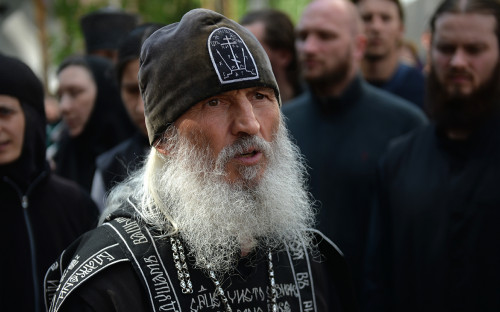
Orthodox Fundamentalism Threatens Russian Patriarchate and Kremlin
Publication: Eurasia Daily Monitor Volume: 17 Issue: 102
By:

Radical Russian Orthodox fundamentalist Shiigumen Sergey, who controls a monastery in the Urals and has attracted a wide following across Russia, has demanded that Patriarch Kirill and President Vladimir Putin both leave their posts and hand their powers over to him (Ahilla.ru, July 13). That bold ultimatum, in its sheer outrageousness, spotlights an issue that has attracted remarkably little attention until now: Christian Orthodox fundamentalism and the threat it poses to the Moscow Patriarchate of the Russian Orthodox Church (ROC) as well as to the Kremlin. The danger comes not from the possibility that either Russian leader is about to accede to this wild insistence but because it shows that there are a growing number of Russian Orthodox hierarchs and laity who reject the slavish obedience of the Patriarchate to the state. And despite their often-reactionary views, these people are exploiting the ongoing COVID-19 pandemic to spread such ideology far more effectively than their opponents. As a result, it is becoming ever more difficult for the Kremlin to continue to rely on the ROC as a major ideological weapon both at home and abroad.
As in past cases, both the Patriarchate and the Kremlin have adopted a whack-a-mole approach, disciplining the priest involved first via church law and then by applying civil law, rather than addressing the larger problems the Urals region abbot represents. The key precedent for Moscow’s response to Shiigumen Sergey was its earlier response to another Orthodox fundamentalist, Bishop Diomid of Anadyr and Chukotka, a decade ago (Nr2.ru, Windowoneurasia.blogspot.com, June 30, 2008). Such a strategy may remove from the scene the individuals involved, but they do little to solve problems and may, in fact, make them worse for both the Church and the state.
Many analysts in Russia and the West are accustomed to speaking about fundamentalism in Islam, but fundamentalism exists in every religion, arising as it does out of a sense among some of its followers that they must turn away from leaders who have violated the basic provisions of the faith and go back to first principles. Now, in Russia at least, analysts are beginning to focus not just on how Orthodox fundamentalism is challenging the Church hierarchy but also how they are affecting relations between the ROC and the Russian state and demanding a voice in the formulation of state policy.
The fundamentalists’ challenge to the ROC is more immediate. But their challenge, both direct and indirect, to the Kremlin is likely to be more fateful.
The coronavirus pandemic has brought both challenges to the fore. Patriarch Kirill, afraid of the growing power of the fundamentalists, deferred to his bishops, many of whom have fundamentalist views themselves, on the question of whether churches would be closed or not. In Moscow, he closed them, but elsewhere each local bishop made his own decision. Both Kirill’s obvious fear of this decentralizing trend within the Church and the new ability of the bishops to act more independently are making the fundamentalists the most important threat to the patriarch and a unified Russian Orthodox Church. Some are now even talking about splits, regional autocephaly or a Russian reformation, Sergey Chaplin, a close observer of the Orthodox Church, says (Carnegie.ru, June 29).
Yet, the fundamentalists have not limited their challenges to the religious sphere. They are now presenting demands to the Kremlin as well, putting forward ideas very much at odds with those of Kirill. One of the most prominent lay Orthodox fundamentalists is Konstantin Malofeyev, a prominent businessman who owns the nationalist Tsargrad television network (see Hot Issue, August 8, 2014). He has assembled around himself people like Nikita Mikhalkov and Sergey Glazyev, and they regularly push their views on political issues via Deputy Prime Minister Andrey Belousov, apparently an ally within the regime (Ura.news, July 8).
Encouraged by that, the group has taken the next step and presented to the Kremlin a 500-page program on how to change Russia’s course and promote development by means of blocking the export of capital, lowering interest rates, and promoting genuine protectionism so as to allow for the re-industrialization of the country, thereby reversing the direction set by more liberal figures like German Gref, Anatoly Chubais and Aleksei Kudrin. In many ways, Malofeyev is preaching to the choir. In particular, the “Orthodox oligarch” has suggested that, although Putin will likely remain after 2024, “anything can happen”; and if the Kremlin leader does go, the liberals will stage a comeback because there are so many of them in office—and only one in prison, where, he contends, they all belong. At the same time, however, Malofeyev highlights a problem that Putin has, so far, been unwilling to address (Ura.news, July 8).
The system of church administration Patriarch Kirill created is collapsing, in part because of the coronavirus but more importantly because of the increasing power of Orthodox fundamentalists across the country. “Orthodox fundamentalism […] has again appeared in the last five years,” Chaplin observed in May (Rosbalt, May 1). It now exists “throughout Russia,” and the health crisis is giving its adherents the chance to spread their views more publicly as they are actively using social networks and working with multimedia content far more often and effectively than do representatives of the established Church. Consequently, Putin cannot count on the Patriarchate to serve the Kremlin, either as an ideological arm within the Russian Federation or as an aid to his expansive ideas about the “Russian World” abroad (Politeia.ru, February 2020; Postimees.ee, July 8).
The Kremlin leader now faces a difficult choice between continuing to rely on an increasingly ineffective Patriarchate, trying to revive it with someone like his favorite Metropolitan Tikhon of Pskov (Gorod 812, May 8), or rebuilding the ROC around the fundamentalists whose very enthusiasm would constitute both an opportunity and a threat. But either of these options could lead to schism—the very thing Putin most wants to avoid.



